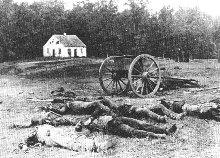Think of this as Volume 14, Number 25 of A-Clue.com, the online newsletter I've written since 1997. Enjoy.
 The Great Recession could easily become a second Depression due to a global outbreak of Hooverism.
The Great Recession could easily become a second Depression due to a global outbreak of Hooverism.
The two cures for the First Depression, and any such collapse, are money and demand. In this case TARP supplied the money. The stimulus was supposed to supply the demand but is proving insufficient. That's partly down to where it went — tax cuts and unemployment benefits have low multiples compared with investments in real capital goods.
The reaction to this shortage of demand by policymakers in Europe and America is the same. Cut demand. Raise taxes, reduce services, increase unemployment.
There is no answer there. How does laying people off put people to work? How does spending less cut your debt if you're also, by doing so, earning less? How does raising taxes, taking money out of the private economy, help anything?
The word for that policy is Hooverism. It is precisely what Herbert Hoover did in the face of the Great Depression. He refused to accept that the private sector was stuck, that someone needed to step up and buy stuff we needed to have made. By the end of his term in office unemployment was nearly 30%. Sounds awful, but the broadest rate of our current unemployment is 17%.
Hooverism is the final triumph of fear. It holds that when bankers and businessmen lose their nerve politicians should too.
It is stupidity writ large.
It's not like there aren't important things that need to be done. Our infrastructure needs to be replaced. We need a more energy-efficient transportation system, a more robust electrical grid. There is lots of profit to be made in alternative energy, if we can just get some incentives for it. These are investments that will pay for themselves, investments that will turn a profit.
Yet the advice of the wise men who caused this crisis is we need to follow Europe's example, cut spending and deficits. It is absolute madness.
One of the great untold stories of the Depression was that FDR was, himself, just as afraid of deficits as Alan Greenspan. He launched a lot of agencies, did a lot of stuff, but their actual impact on the deficit was relatively small throughout the 1930s. He even cut back in 1937, causing a second downturn.
From a purely economic view, Hitler had it right. He pushed demand. He didn't worry about deficits. What he made was wasteful, stupid, murderous — the worst crime of a murderous century. But the economic idea was right. When private industry is fearful, someone has to step up to the plate and buy.
Right now, private investors are willing to hand the U.S. government short-term money practically for free. We're talking "interest rates" of .03% on three-month instruments, .09% on six-month. That's fear. And that's what we have to fear.
When FDR said "the only thing we have to fear is fear itself" we thought he was talking to the common folk, but he was also talking to industry, and to bankers. Nameless, unreasoning fear was keeping any deals from being done. Someone had to step into the market and buy.
Conservatives have a soft spot for military spending. No matter the deficit situation, in good times or bad, they're always scared of someone, always anxious to kill 'em. This President is stuck in two wars because he hasn't been willing to directly confront that fear.
I think he's too timid in the face of this other fear as well. He has become a liberal version of Richard Nixon, feeding his base rhetoric, earning the violent hatred of the other side, but giving that other side everything it wants. Jon Stewart was right last week — in 2010 political terms Nixon was a communist. He sought clean air, clean water, energy independence, and health care for everyone, not because he necessarily believed in such things but because he was counter-punching against a liberal tide that, while ebbing, appeared still in Washington to be rising. (Like I said before, Washington's conventional wisdom is always wrong.)
What 
Investing in things that get a return means you have assets on which you can build, and you're making money with debt rather than letting it go out the door.
Ironic, isn't it? The best answer to Hooverism is something like Hoover Dam.










